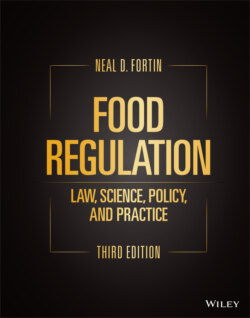Читать книгу Food Regulation - Neal D. Fortin - Страница 38
Due Process
ОглавлениеThe Fifth Amendment due process provision provides that “no person shall be deprived of life, liberty, or property without due process of law.” This clause, along with a similar provision in the Fourteenth Amendment applying due process to state governmental actions, establishes the principle that government must act fairly, according to clear procedures. In its most straightforward sense, due process means fairness in the procedural application of the law. The most basic components of due process fairness are notice and an opportunity to be heard, which were also discussed above regarding the Administrative Procedures Act.
Additionally, notice means that the government must give adequate information about legal requirements to the persons affected so that they can avoid the consequences of noncompliance. Generally, fair notice means that a law must be published before being enforced. The law must also be written clearly enough so that those subject to the law can understand what the law requires. A law that is so vague that reasonable people may not understand its meaning lacks basic fairness and violates due process. Such statutory or regulatory language could be invalidated by the courts as “void for vagueness” under the Due Process clause.
Due process also requires that when the government takes action affecting a person’s rights or entitlements, the person must be given notice of the intended action and an opportunity to challenge the determination. For example, a government agency cannot revoke a food establishment license without giving the owner notice of the action and, under most circumstances, an opportunity to challenge the action before the license is revoked. In an emergency situation the agency may unilaterally revoke a license, but the agency must then give the owner an opportunity to challenge the revocation in a later hearing.
